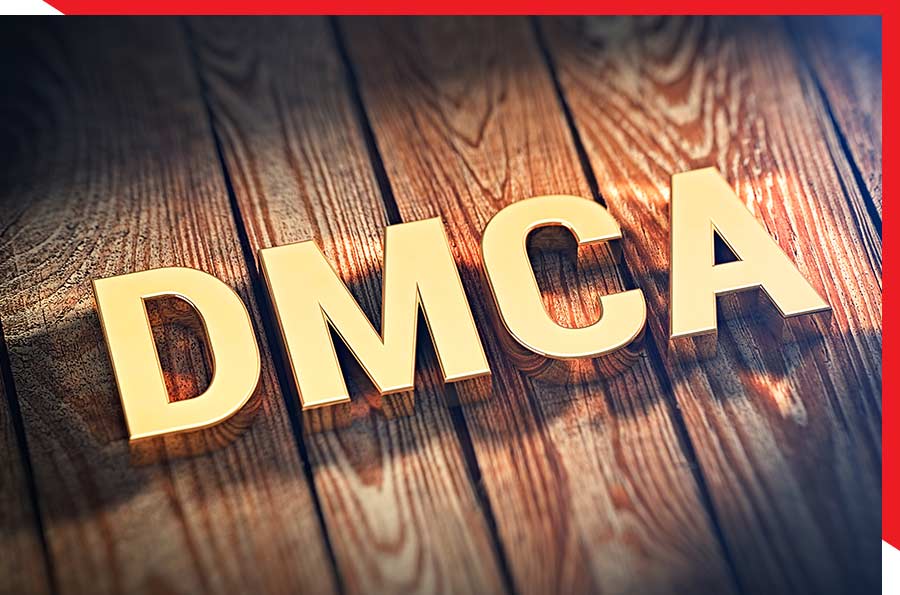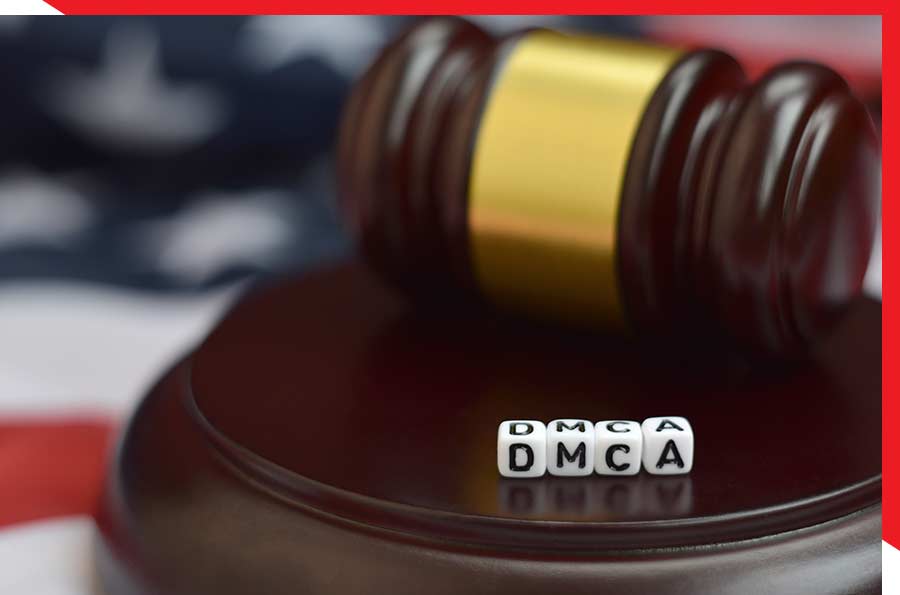How The DMCA Might Affect Your Copyright
For any professional who generates creative, original work, mobile apps and digital platforms create brand new concerns regarding copyright.
The ease at which individuals and businesses can upload copyrighted written content, images, and videos means there are more opportunities to use your work without permission or compensation. It is important that you enforce your rights and seek damages when copyright infringement occurs.
What is the role of platform service providers when it comes to copyright infringement? Can they be liable every time someone posts or uploads content to their site that infringes your copyright or someone elses?

The Digital Millennium Copyright Act
Facing potential liability for copyright violations would mean providers must closely monitor every upload. It would be a costly and nearly impossible task for any service provider to review that much user content and do so effectively to ensure there are no copyright violations.
Congress passed the Digital Millennium Copyright Act () (DMCA) to address these issues. The DMCA seeks to strike a balance by giving copyright owners and online service providers specific ways to protect the rights of both parties.
The most important takeaways from the DMCA for content creators are the takedown notice and the safe harbor provision. You should understand how these provisions of the DMCA might affect your legal rights.
At Sanders Law Group, our US Copyright Attorneys strive to help creative professionals protect their copyrighted work. We know the amount of effort that goes into creating something original and how hard it can be to track who is using your work and how. We understand how difficult it can be to earn a living as a photographer, artist, writer, fashion designer, or filmmaker, especially in the digital era.
We want to ensure you receive fair pay for what you do. Call our lawyers at 888-348-3090 to pursue the maximum damages allowed by law when someone infringes on your copyright.
What is a DMCA Takedown Notice?
Copyright owners can send DMCA takedown requests to online services providers, asking them to remove any content that infringes their copyright. The service provider then has a reasonable amount of time (usually up to 30 days) in which it must respond with an action plan to remove the offending material.
All online service providers must comply with the DMCA takedown requests to remain protected from liability under the safe harbors provision of the infringing material.
If they fail to respond or take action, they can lose the protection of this law and may be held liable for damages.

What Should a DMCA Takedown Notice Say?
An enforceable takedown notice must include specific information about the content to be removed. This is required so the online service provider can locate and remove the alleged infringing material.
A DMCA takedown notice must include the following information:
- The copyright owner’s signature (or the signature of their authorized agent).
- The identification of the copyrighted work that was allegedly infringed.
- A description or information (such as the URL) about the location of the work
- The copyright owner’s contact information (or that of an authorized agent). Contact information should include name, mailing address, phone number(s), and email address.
- A statement of good faith. The notice must include something that there is a good faith belief that the content is being used in a manner not authorized by the copyright owner, their agent, or the law.
- The notice must also contain an “under penalty of perjury” clause stating that the information in the takedown notice is accurate.
It is critical that your notice contains all of the required information. If it does not, it might not be enforceable, and the content provider may not honor the request.
Sending Your DMCA Takedown Request
A DMCA takedown notice usually goes to the host of the website where the content was posted. With sites like Facebook and Twitter, it is easier to find the company and they have departments dedicated to addressing these issues.
However, smaller individual websites may be harder to track down. Owners are often hidden away. In these cases, we may direct the request to the “web host” – the company on whose servers runs the website .
Locating the Web Host
The host can be located by querying the ARIN WHOIS database for the domain name and then checking the “hostname” field in the output to determine which IP address is associated with that domain name.
If the host is not registered on the Internet, it may still be reachable through an ISP (Internet Service Provider) network that connects that host to the internet. There are many ways to track down the parties.
Of course, as a copyright owner, you may also send a takedown notice directly to the individual infringer if you are able to locate and identify him or her. If you can, you may send a notice to that party as well.
What Happens After Sending the DCMA Takedown Notice?
When someone receives the takedown notice, that party must promptly remove or disable access to the infringing content or risk facing a lawsuit for copyright infringement.
Online service providers should send a copy of the takedown notice to the user who is allegedly infringing. The online service providers must also inform the posting user that they may submit a counter notice if they believe their content was misidentified as infringing.
What is the Safe Harbor Provision of the DMCA?
There are many online providers that host content uploaded by users. For these service providers, it can be quite challenging to monitor everything posted on their sites. The DMCA contains a safe harbor provision that might exempt these providers from liability from copyright infringement.
For example, if providers are not engaging in copyright infringement or are unaware of the infringement of others, they might receive protection from liability.
To take advantage of the protection offered by the safe harbor provision, online service providers must have a clear DMCA policy. The policy must include the contact information for its designated copyright agent for the service of copyright claims. The provider must also have a “repeat infringer” policy.
Most importantly, to remain under the DMCA safe harbor protections, the online service provider must implement the procedures for the DMCA takedown notice process and repeat infringer policy.
To reasonably implement such policies, online service providers must terminate accounts of users who are designated as repeat infringers or repeatedly charged with infringement. They must also retain an accurate record of users who allegedly infringed on copyrighted works.
Filing Copyright Infringement Lawsuits and Seeking Damages
The DMCA does not prevent you from filing a lawsuit for copyright infringement. Nor does it affect your legal rights to collect compensation allowed by US Copyright Law.
Actual damages for copyright infringement reflect the actual economic damages you suffered because of the infringement. Actual damages often include any profits earned from the infringement.
Statutory damages are set by law and can range anywhere from $750 to 30,000 per work infringed upon. If the copyright infringement is willful, statutory damages can be as much as 150,000 per copyrighted work.
You might be entitled to collect actual damages or statutory damages for the copyright infringements, as well as attorney’s fees.
How Our US Copyright Attorneys Can Help
The DMCA takedown notice and safe harbor provisions are complex. The parties must comply with the specific requirements in order to receive protection. The failure to do so can result in lost opportunities and the inability to enforce your legal rights.
Our US copyright attorneys at Sanders Law Group can help with all of your copyright needs. Our lawyers handle the following:
- Registering copyrights
- Negotiating and drafting licensing agreements
- Enforcing licensing agreements
- Filing copyright infringement lawsuits
- Negotiating copyright settlements
- Litigating copyright claims
- Preparing and sending takedown notices
If you are a photographer, videographer, screenwriter, graphic designer, or another creative professional, call Sanders Law Group today at 888-348-3090 for a free evaluation of your copyright claim. Let our attorneys see if we can help you.


